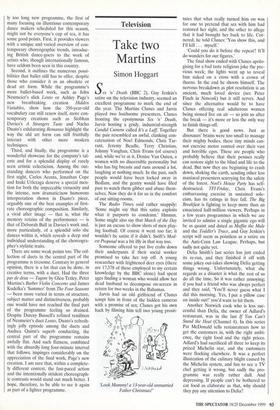Dance
Celebration of International Choreography (Royal Opera House)
New beginnings
Giannandrea Poem
Two weeks ago, the Royal Opera House's opening celebration gala showed that the Royal Ballet was back in its reno- vated home in splendid form. The success of the evening, however, did not depend exclusively on the participation of a superb roster of stars and some of the finest danc- ing seen over the last few years. One of the evening's most successful ingredients was also the choice of excerpts from the com- pany's repertoire, which, apart from some inevitable exceptions, stood out for its orig- inality and never slipped into that 'please- the-audience' predictability found in most celebratory performances. Whether such a selection was meant to be read as a subtle hint at the unconventionality of the compa- ny's future programming is difficult to say.
Excellent dancing and a brave, bold pro- gramme choice are also the two main ingredients of the first Royal Ballet perfor- mance of the season, A Celebration of Inter- national Choreography. To kick off with an evening devoted entirely to contemporary dance-making might look hazardous, even though, historically speaking, the Royal was one of the first ballet companies to include 'modem' works in its repertoire. Both the artistic connotation of the stan- dard ballet company and the perception of what is expected from it have changed radi- cally within the last ten years; choreograph- ic eclecticism has thus become the keyword of the artistic policies pursued by many important ballet institutions all over the world. The new all-contemporary mixed bill, therefore, can be seen as the Royal Ballet's response to the line of action cur- rently taken by other international ballet giants. The timing could hardly have been more perfect, for the refurbished premises and the new beginnings provide the ideal atmosphere for any sort of improvement and new direction within the already vast repertoire.
Although the richly composite and slight- ly too long new programme, the first of many focusing on illustrious contemporary dance makers scheduled for this season, might not be everyone's cup of tea, it has some good points. First, it provides viewers with a unique and varied overview of con- temporary choreographic trends, introduc- ing British dance-goers to the work of artists who, though internationally famous, have seldom been seen in this country.
Second, it outlines the numerous possi- bilities that ballet still has to offer, despite those who consider it as an obsolete or dead art form. While the programme's more ballet-based work, such as John Neumeier's slick Lento or Ashley Page's new breathtaking creation Hidden Variables, show how the 350-year-old vocabulary can still renew itself, more con- temporary creations such as Siobhan Davies's A Strangers Taste and Nacho Duato's exhilarating Remanso highlight the way the old art form can still fruitfully interact with other more modern techniques.
'Third, and finally, the programme is a wonderful showcase for the company's tal- ents and for a splendid display of rarely seen artistic eclecticism. Among the out- standing dancers who performed on the first night, Carlos Acosta, Jonathan Cope and Inaki Urlezaga deserve a special men- tion for both the impeccable virtuosity and the intense, now dramatic/now humorous interpretation shown in Duato's piece, arguably one of the best examples of first- rate choreographic composition. Similarly, a vivid after image — that is, what the memory retains of the performance — is that of Deborah Bull in Davies's work and, more particularly, of a splendid solo she dances within it, which reveals a deep and individual understanding of the choreogra- pher's stylistic traits.
There are some weak points too. The col- lection of duets in the central part of the programme is tiresome. Contrary to general opinion, there is a lot that can be done, in creative terms, with a duet. Had the three pas de deux — Tagore by Glen Tetley, Peter Martins's Barber Violin Concerto and James Kudelka's 'Summer' from The Four Seasons — been more varied in terms of structure, subject matter and distinctiveness, probably one would have not reached the final part of the programme feeling so drained. Despite Darcey Bussell's refined rendition of Neumeier's duet Lento, Duato's refresh- ingly jolly episode among the duets and Andrea Quinn's superb conducting, the central part of the programme remains awfully flat. And such flatness, combined with the absurdly long four-minute interval that follows, impinges considerably on the appreciation of the final work, Page's new creation. I am sure that, within a complete- ly different context, the fast-paced action and the intentionally strident choreograph- ic contrasts would stand out much better. I hope, therefore, to be able to see it again as part of a lighter programme.























































































































 Previous page
Previous page